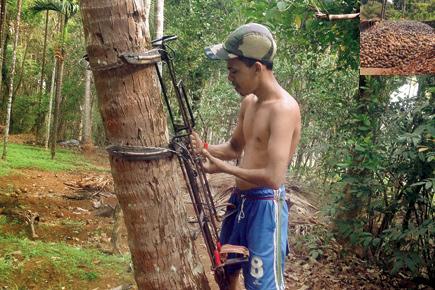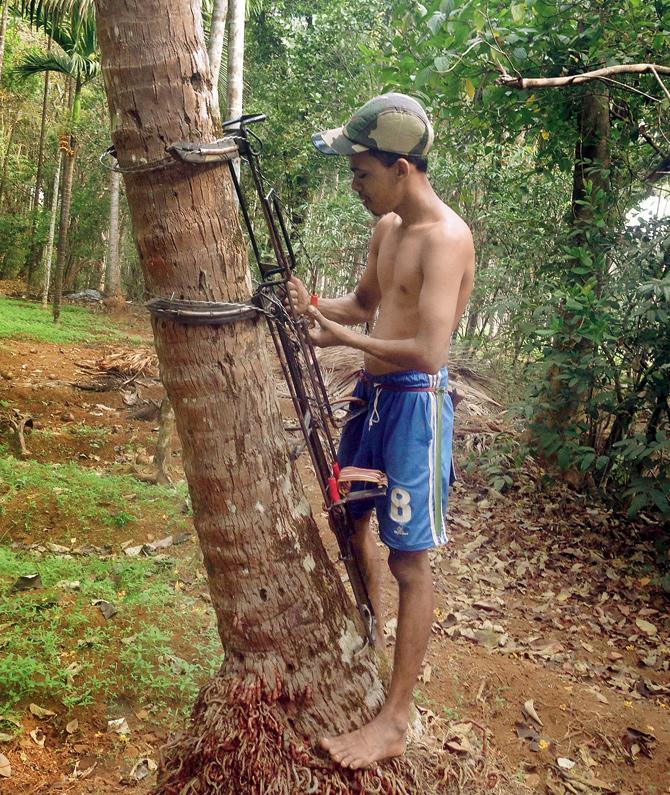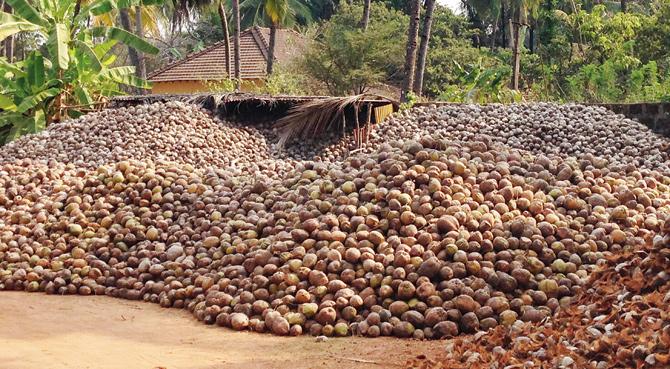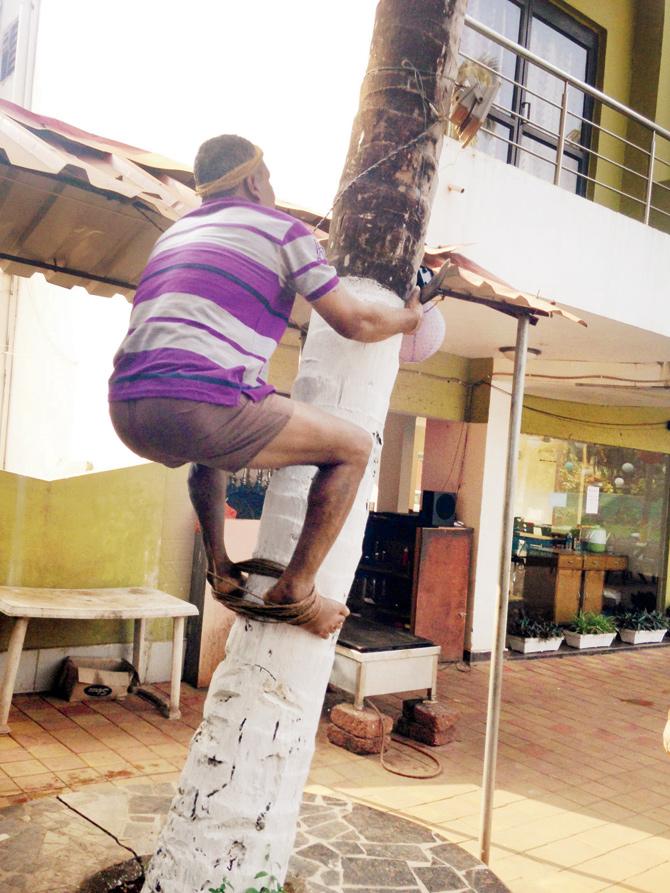With padekars -- traditional tree climbers who pluck the ripe drupe -- looking out for less risky jobs, who will pluck Goa's coconuts?

The coconut plucking machine is tough to use on trees that are bent
Even as politicians and environmentalists in Goa argue on the merits of calling the coconut, a tree or grass, the residents of the coastal state have tougher problem to deal with — who will pluck the coconuts?
ADVERTISEMENT

The coconut plucking machine is tough to use on trees that are bent. Pics/Joseph Zuzarte
Once an integral part of Goa's agrarian economy, the coconut has been pushed out of public consciousness by the boom in the tourism industry that began 40 years ago, with many abandoning their traditional occupations for better-paying jobs. Take for instance, Calangute — the state's most popular beach destination.
Before the tourism boom, coconut farming was one of the main activities here. Now, it's overrun by large resorts, with the surviving coconut trees only a decorative element. Even the numbers of the traditional tree climbers, the padekars, has dropped to three in Calangute from hundreds.

Padekars are paid Rs 800 per day by GHDC
"It is a very risky job," says Vishnu Mandrekar, 45. An average work day for him means climbing 30-40 coconut trees over a morning and evening shift i.e. from 7 am to 6 pm with a break of six hours. The rest is necessary. With an average height of 50 feet, the tree poses a challenge to climb. "Sometimes when you're up on a tree, you get a muscle cramp or sprain, making it difficult to climb down. Many padekars have fallen and fractured their limbs. We don't have insurance or any other financial protection either," he says.
It's not that the job is lucrative either. The Goa Horticultural Development Corporation (GHDC), which in 2013 started a scheme to directly recruit padekars who are then supplied to coconut farms for a fee, pays them Rs 800 per day. GHDC charges Rs 65 per tree from the owner if the number of trees is a maximum of six. The rate increases to R400 with a donation of five coconuts if the trees number between seven and 20. A coconut currently sells for around Rs 30. Traditionally, padekars were paid half in cash, half in coconuts. However, padekars not employed by GHDC earn between Rs 60-100, depending on the number of trees to be plucked and trimmed.

Climbing made easy
The Directorate of Agriculture also introduced coconut climbing machines, developed in Kerala, to make it safer and easier to climb coconut trees. But these have not become popular, even though they cost only R2,700 and the government offers a 75 per cent subsidy to buyers.
The GHDC has around 25 padekars, says Madhav Kerkar, general manager, and most use the machine. The machine consists of two metal loops for holding the feet with a handle at the top for hand grip and a pedal base at the bottom. The loops are put around the tree trunk on opposite sides. The loop is lifted up by the simultaneous movement of the hand and feet, propelling the climber up the tree. A safety rope, like that used by rock climbers, keeps the climber safe from the risk of falling.
Krishna Parab, 34, who works for the GHDC, says, "You can climb much faster with the machine, and the risk of falling or getting injured is eliminated." The only problem is that the coconut tree has to be straight, while most coconut trees in Goa are bent at an angle. "You cannot use the machine if the tree is bent," Mandrekar says.
Traditional padekars climb using only a small, coiled rope called kodu, attached to their feet; but these are now few. Brescia D'Silva, a housewife in Benaulim, south Goa, once a hub of coconut farming, says, "I have heard that you get those who operate the machines, but I have heard that they don't clean the trees properly."
Seeking external help
Activist and housewife from Calangute, Geeta Parab, says, in her village it's now padekars from Kerala who come and offer to climb their coconut trees. But the Kerala padekars only climb using machines, which limits their utility.
Sharad Gaonkar, supervisor at GHDC, who oversees hiring, says, "People are reluctant to take up this profession, and there is only so much we can do. I have a long waiting list of farm owners who want to hire our padekars."
To bypass the need for padekars, people have taken to growing shorter, dwarf varieties of coconut trees, so that the fruit can be plucked using a ladder. But the coconuts aren't the same. "The short trees produce coconuts that have a thinner kernel; the traditional tall coconut trees grown in Goa have a thicker kernel which makes for better fish curry; you don't get the same taste with the new coconut," explains Mandrekar about the reasons why people still plant the taller varieties.
The taller trees bend with time because of strong winds. To counter this, farmers like Shindolkar grow coconut trees in the midst of a dense plantation of mango, for instance, so that the trees are sheltered and grow straight. But, others, with smaller orchards, don't enjoy this luxury.
With nobody to tend to them, the trees are now posing a hazard, and deaths by coconuts falling have been reported. There are also fights between neighbours when palm fronds and coconuts come crashing down on roofs, and vehicles.
Cutting down isn't an option as you need permission from the Forest Department. This, says Goa's forest minister Rajendra Arlekar, was the reason why the Goa government amended the Tree Amendment Bill making it easier to cut the trees.
 Subscribe today by clicking the link and stay updated with the latest news!" Click here!
Subscribe today by clicking the link and stay updated with the latest news!" Click here!








